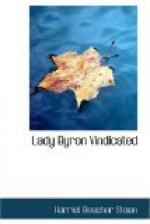Lord Byron determined to conquer the virtuous scruples of the Noctes Club; and so we find this same Dr. William Maginn, who in 1819 wrote so valiantly, in 1822 declaring that he would rather have written a page of ‘Don Juan’ than a ton of ‘Childe Harold.’ All English morals were, in like manner, formally surrendered to Lord Byron. Moore details his adulteries in Venice with unabashed particularity: artists send for pictures of his principal mistresses; the literary world call for biographical sketches of their points; Moore compares his wife and his last mistress in a neatly-turned sentence; and yet the professor of morals in Edinburgh University recommends the biography as pure, and having no mud in it. The mistress is lionized in London; and in 1869 is introduced to the world of letters by ‘Blackwood,’ and bid, ’without a blush, to say she loved’—
This much being done to all England, it is quite possible that a woman like Lady Byron, standing silently aside and surveying the course of things, may have thought that Mrs. Leigh was no more seduced than all the rest of the world, and have said as we feel disposed to say of that generation, and of a good many in this, ’Let him that is without sin among you cast the first stone.’
The peculiar bitterness of remorse expressed in his works by Lord Byron is a further evidence that he had committed an unusual crime. We are aware that evidence cannot be drawn in this manner from an author’s works merely, if unsupported by any external probability. For example, the subject most frequently and powerfully treated by Hawthorne is the influence of a secret, unconfessed crime on the soul: nevertheless, as Hawthorne is well known to have always lived a pure and regular life, nobody has ever suspected him of any greater sin than a vigorous imagination. But here is a man believed guilty of an uncommon immorality by the two best lawyers in England, and threatened with an open exposure, which he does not dare to meet. The crime is named in society; his own relations fall away from him on account of it; it is only set at rest by the heroic conduct of his wife. Now, this man is stated by many of his friends to have had all the appearance of a man secretly labouring under the consciousness of crime. Moore speaks of this propensity in the following language:—
’I have known him more than once, as we sat together after dinner, and he was a little under the influence of wine, to fall seriously into this dark, self-accusing mood, and throw out hints of his past life with an air of gloom and mystery designed evidently to awaken curiosity and interest.’
Moore says that it was his own custom to dispel these appearances by ridicule, to which his friend was keenly alive. And he goes on to say,—




